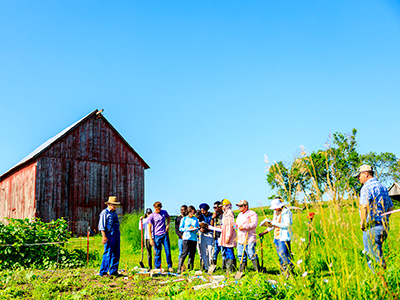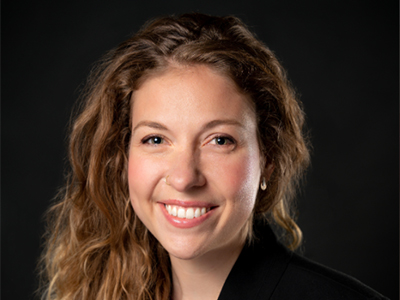On a warm summer day, down a gravel road south of Lincoln, a small farm hosts about twelve students studying biological systems engineering and agricultural systems technology at the University of Nebraska–Lincoln (UNL). Now in their second week of the course, they show teamwork and camaraderie as they dig a trench for an irrigation furrow. The air is thick with humidity, and cicadas are sounding in symphony with the distant sprinklers. The students lay a flexible plastic tube across the field plot. When the spigot is turned, the tube slowly swells from one end to the other. The students work to keep the tube in place as the water moves through until it finally flows through the openings, spilling out into the furrows of the field, where they begin to time its flow.
The Irrigation Summer Field Course offers a unique opportunity for students to gain hands-on experience in irrigation and water management. Through a combination of instruction and practical field experiences, they gain invaluable knowledge and the creative problem-solving skills essential for sustainable agricultural applications. The course was established in 2012 by UNL's Department Biological Systems Engineering (BSE) and the Daugherty Water for Food Global Institute (DWFI).

The Summer 2024 course was taught by a team of experienced UNL faculty, including Derek Heeren, Aaron Mittelstet, and Dean Eisenhauer, and attracted students from around the world who were eager to take their education beyond the classroom.
Participants visited a center pivot manufacturer to gain insights into irrigation technology. They also conducted a stream lab and explored water management systems firsthand by visiting the impressive hydrological dam at Lake McConaughy and interacting with Nebraska's unique Natural Resources Districts, which manage water between agricultural, environmental and urban user groups.
Melina Petenatti, a BSE student from Argentina, was enthusiastic about seeing the entire system operate as a whole between water sources and users. "Seeing how the water is managed, how the technology works, and how it all flows together perfectly is truly incredible," she said.
Akeem Adeniran, a BSE student from Nigeria, shared his experiences: "We've visited the Central Nebraska Public Power and Irrigation District and manufacturers of sprinkler and center pivot irrigation systems. Being where these systems are actually produced, seeing every step involved, has been fascinating."
In addition to learning about the agricultural system as a whole, students also gain an understanding of the role different irrigation technologies play in water management. Eisenhauer, a BSE emeritus professor and DWFI Faculty Fellow, hosts the students each year on his farm, where they implement furrow irrigation. The experience is especially beneficial for students who plan to implement irrigation technologies tailored to specific climates and landscapes when they return to their home countries.
Hasnat Aslam, a BSE student from Pakistan, came to the course with a strong background in flood management, hydrological and hydraulic modeling, and agricultural practices. However, he recognized the need for more irrigation-specific knowledge. The course provided him with practical experience in implementing sustainable water management technologies.
Richard Ortega, a university professor from Panama, plans to share his newfound knowledge from the course with his own students. "All of this knowledge will be transferred to my bachelor students. This is my plan,” he says.
Heeren, a BSE professor and DWFI Faculty Fellow, says he’s grateful to both DWFI and BSE for their ongoing support of this experiential learning course. He enjoys working with students from all over the globe, and the creative problem-solving that comes from collaborative teams in the course. Each team is composed of three students, each representing a different continent. He also highlights the course's emphasis on experiential learning. "One of my favorite aspects is seeing the in-depth thinking that comes from the practical activities, the 'aha' moments, and connecting the dots to the broader implications of their work," he said.
Adeniran summarizes the benefits of the course: "I've learned everything in irrigation from undergrad from books, and even some from YouTube videos. Now, I can confidently say I'm an irrigation specialist. This course has helped me find a balance between theoretical and practical knowledge."


